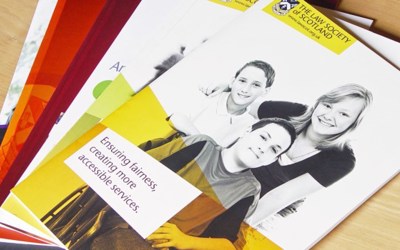Greater consistency needed for vulnerable accused people
Vulnerable people accused of a crime in Scotland need to be treated consistently and fairly, says a report published today. It sets out recommended improvements to how vulnerable accused people are identified and progress through the criminal justice system.
The report by the Law Society of Scotland’s Criminal Law Committee includes five practical steps to ensure the human rights of vulnerable people accused of criminal offences are respected and taken into account. These include clearer and more consistent definitions of vulnerability, the creation of a central knowledge hub and a review of how new technology can improve information sharing.
The publication follows a roundtable event which brought together practitioners, representatives from the criminal justice organisations, third sector groups involved with vulnerable accused persons and Scottish Government policy officials. The roundtable considered vulnerable persons across the Scottish criminal justice system, but focused on accused persons, an area which has received less policy development attention.
Marking the report’s publication, Law Society of Scotland President Alison Atack said: “the greater protections being developed for vulnerable witnesses are welcome, but we must not lose sight of how vulnerable people accused of criminal offences themselves experience the criminal justice system. Everyone accused of a crime is entitled to respect for their human rights but if vulnerabilities are not identified early on there is a risk people will not be treated consistently and fairly and can cause delay in the justice system.”
Law Society of Scotland Criminal Law Committee Convener Debbie Wilson added: “any accused person unfamiliar with the justice system can find it hard to understand the processes, procedures and language involved, so for people with vulnerabilities this can present an even greater challenge. Our population is ageing and becoming more diverse, so different groups are increasingly coming into contact with the criminal justice system. By creating a central knowledge portal to share best practice and carrying out proper research into which vulnerabilities need greater support we can make sure the system works for everyone.”
Janis McDonald, Chief Officer at deafscotland, one of the third sector organisations involved in the roundtable, said: “It was important to deafscotland to be involved and participate actively to contribute examples of lived experience, barriers and issues that are valid for those affected by deafness across the spectrum that includes Deaf/Deaf Sign Language users; Deafened; Deafblind; and Hard of Hearing. Having us and others from the Third Sector actively involved in the development work is hugely important and beneficial for the way forward in Scotland. It is great to see Scotland leading the way in fairness, inclusion and inclusive practices.”
The report and the event focused on accused persons but the issues identified apply to all vulnerable people coming into contact with the criminal justice system. The report suggests the Scottish Government may be best placed to lead on some of the recommendations, with others to be taken forward by the Law Society itself.
The recommendations in full are:
- Development of a framework of understanding to be shared across the Scottish criminal justice system following a multi-agency review of definitions and interpretations of vulnerability
- A review of existing legislation, measures and practices, including ongoing consultations, in relation to vulnerable persons leading to the development of a central portal of knowledge and information
- A review of groups for whom there is limited support and representation within the Scottish criminal justice system
- A review of the prevalence of individuals with vulnerabilities in the Scottish criminal justice system and the types of vulnerabilities most commonly encountered
- A review of how the use of existing and innovative technology can better support information sharing and data protection

Research & policy
Learn more about our work conducting research on important issues about the law, and influencing law and policy at home and abroad.

Research
Our Intelligence, Insight and Research team undertakes and commissions research into issues that affect our members, the wider legal profession and those who engage with it.

Influencing the law and policy
One of the main functions of our policy team, along with our network of volunteers, is to analyse and respond to proposed changes in the law.

Equality and Diversity
Information about how we meet our responsibilities to our employees, the public and members, and the support we provide for members.

